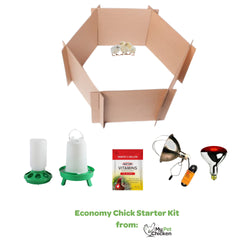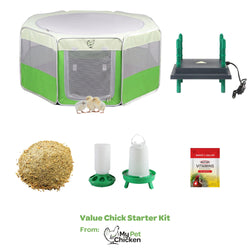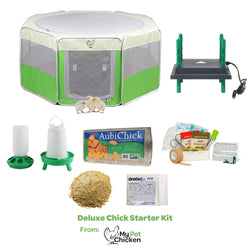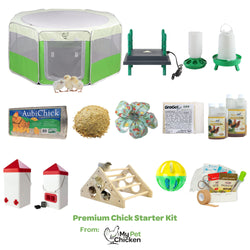Top 4 Compost Methods using Chicken Manure
Back to blog
It's time to clean the chicken coop again and we have 4 compost methods for using chicken manure in your garden. While coop cleaning is not the best part of owning chickens, it's definitely necessary. You are left with a pile of bedding and droppings, also known as the second-best thing a chicken can give us other than fresh eggs! Yes, seriously. You've just collected some really good stuff there. That soiled bedding is now compost gold and perfect for feeding to your garden...almost.
See, Chicken manure is high in nitrogen and runs really 'hot' in a garden bed when it's fresh. Adding to the garden straight out of the coop will cause your plant's roots to 'burn'. Essentially killing all your hard work in the garden beds. Even using pine shavings can be too acidic to add directly to soil as-is. Composting chicken droppings and soiled bedding is the correct way to get it ready to feed your garden.

4 Methods to compost chicken manure and bedding
Here are the 4 best methods of composting which incorporate chicken manure that the staff of My Pet Chicken prefers to use:
1. Set It and Forget It
This is the easiest compost method using chicken manure. Yes, you can dump your pile over in the unseen part of your yard, or along an area you don't frequent. Just leave the pile to decompose in its own time with no intervention. I've done this and I find by the next season, everything on the bottom of that pile from a year ago is just right to add to my soil as-is now. It's a long wait but worth it.
2. Open Air 3-Stage Composting
This is another easy method that is considered a traditional method of composting. You can create three separate piles for this composting method. One pile for new compost, one pile for "cooking" compost, and the third pile for the finished dirt that goes back to feed your garden.
- Stage 1 includes collecting items like food scraps, paper, yard waste, and soiled chicken bedding. Add all these compost ingredients to a dedicated pile. This pile will get hot in the center, up to 104 degrees, and help cook the compost while allowing beneficial bacteria to thrive. This pile will then begin the
- 2nd stage process where the composted items break down into their smaller bits and "cook" just before becoming dirt. It's recommended to turn the compost ingredients weekly using a pitchfork in order to help speed up the process by delivering oxygen where needed.
- Stage 3 - After 4-6 months, your scraps have now turned into beautiful compost ready to be added to your garden.
3. Compost Tumbler
This small tumbler is a rotating bin. These often come with two compartments. In one compartment, you will add fresh compost ingredients while the ingredients in the second compartment are left to "cook." It's important to turn the tumbler regularly. The time it takes depends on the moisture content and temperatures in the tumbler. It can be pretty fast at an average of fewer than 6 months. Adding a compost accelerator can speed this up even more.

4. Bokashi Composting
This is really fermentation composting. The goal is to ferment your collected waste over a 2 week period, then bury the waste right into your garden bed where you want to use it. Within 2-4 weeks, the compost will be completely broken down into dark soil. Some tips for starting Bokashi composting are: You can begin with a starter kit, including inoculated spent grains or a compost accelerator. You will need a container you can seal to put your compostables and soiled litter in with the inoculated grains. Double stacked 5-gallon bins are a good and alternative choice for this method. Make sure the container also has good drainage on the bottom so 'sludge' doesn't build it.
Use your flock to live a more sustainable lifestyle
A backyard chicken flock helps you have a more sustainable lifestyle since you have no waste actually leftover from your chicken keeping. They have gifted you with food and now with a healthy fertilizer for your garden. Whether you grow trees and bushes for shade, flowers for a beautiful landscape or fruits and veggies to eat... your chickens are there to help. What amazing little creatures! By implementing any of these compost methods using chicken manure, it will help you live a more sustainable lifestyle.





3 comments
Great info, thanks.
———
My Pet Chicken:
You’re most welcome! We’re happy you found this helpful.😃
That information is perfect to close the circle of life thanks so much
———
My Pet Chicken:
You’re welcome! We are glad you found this article useful!
Great information